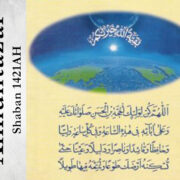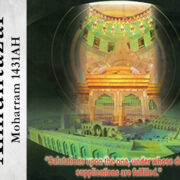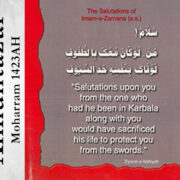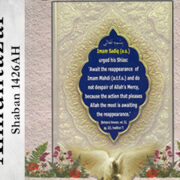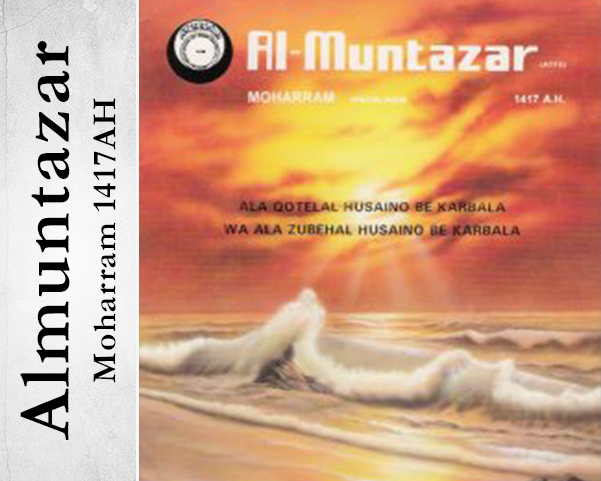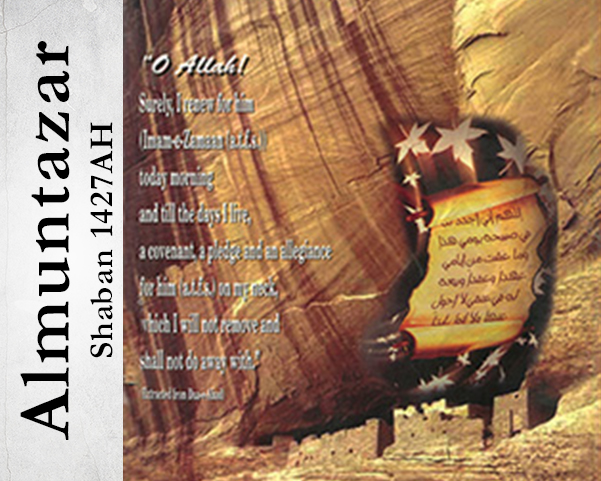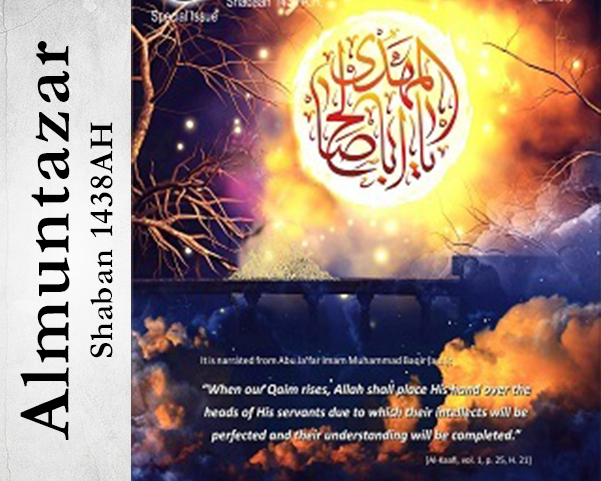Admittedly the title seems to suggest that the person (who has posed the questions to Imam a.s.) actually had the distinction of meeting Imam-e-Zaman (a.s.). Hence we would like to clarify at the outset that we have not actually met Imam-e-Zaman (a.s.). However, it is said that letters and messages are “half a meeting”. Because, through letters a person `converses’ with the addressee. Thus the style of writing a letter is very different from that of writing an essay or a book.
On the commands of Allah, Hazrat Vali-e-Asr is in occultation right from the commencement of his Imamat. Hence as opposed to his forefathers (a.s.), Imam’s meetings with his Shias have been few and far between. By and large, the problems of the people have been presented before his esteemed self in the form of letters and “Areeza” (“Areeza” is a letter of requests written by the Shias to the Imam of their time). And Imam (a.s.) too has reciprocated in a similar manner. The letters of Imam-e-Zaman (a.s.) are terminologically called as “Tawqee“. These Tawqees have been assimilated in several books. Hazrat Ayatullah Syed Hasan Shirazi (may Allah purify his soul) has compiled these letters in a book by the name of “Kalemat-ul-Imam al-Mahdi“. This single book contains all the letters of Imam (a.s.) which are found in different books. Originally the book was written in Arabic. Dr. Syed Hasan Sabzawari has translated this book into Persian by the same name. The answers to the questions mentioned below, have been given by Imam (a.s.) himself. These replies have been compiled from various letters that were sent to him (a.s.) in the course of his Ghaibat. To that extent the letters of Imam (a.s.) constitute “half a meeting” with him, and the same is being presented in your service. We pray to Allah that this endeavour is accepted by our pure Imam (a.s.) We look forward to that day when we can present to you an interview conducted by personally meeting Imam (a.s.). Inshallah.
Q.1. Where do you live in these days of your occultation?
Ans : Presently, we are living away from the settlements of the oppressors. Till such time that the reins of the worldly governments are in the hands of oppressors and tyrants, Allah has willed for us and for our Shias that I should live away from the people. However, we are cognizant of all your actions.
pg.190
“At this point we are dwelling amidst some remote mountains. The place is surrounded by gardens. I am staying here because of the unbelievers. But very soon I will move to the plains that are not very far from the society. “
pg. 196-198
Q.2. What is the reason for the Shias being involved in so many calamities and afflictions?
Ans : One of the reasons is that the Shias are perpetrating those actions which the people of the past avoided. These Shias have forgotten the covenant of Allah and have violated it.
pg.19
“And had our guardianship and protection not been there, then calamities would have surrounded you from all sides and destroyed you.”
pg.19
(This connotes that Imam (a.s.) nullifies most of the calamities with his existence. Else the plight of the Shias would have been most pitiable.)
Q.3. In these last days, what is the best mode of keeping one’s self safe from evils and corruption?
Ans : Piety and abstinence. I pledge for the salvation of the one who does not desire
any rank or position in any acts of evil and corruption.
pg. 190
The believer who possesses the fear of Allah and is prompt in returning the people their dues, will be secure from the evils of the time. And the one who acts miserly in disseminating the bounties of Allah to the people, will be from among the losers on the Day of Judgement.
pg.198-200
Q.4. What are our responsibilities in your occultation?
Ans : Perform those actions which bring you closer to our love and affection and refrain from all those actions that become the cause of our displeasure and dissatisfaction.
pg.192
Q.5. How is it possible to meet you?
Ans : If our Shias (may Allah grant them the taufeeq of obedience) had been united in fulfilling the pledge, then certainly there would have been no delay in our meeting and they would have been graced with this opportunity several times. However, their actions are most unbecoming of Shias, and have kept them away from us.
pg.200
Q.6. How can we disgrace and humiliate Shaitan?
Ans : Reciting namaz on the dot of time at its very outset (Awwal-e-Waqt) is a cause of disgrace for Shaitan.
pg. 202
Q.7. Can a person utilize for his personal use a thing which has been endowed (Waqf) for you?
Ans : If the thing has been handed over to us then the person has no right over it —
whether he needs that thing or not.
pg. 202
Q.8. What do you have to say about those people who use your things for their own personal benefits?
Ans : To use someone’s belongings without his permission is prohibited. Hence the one who considers our money as permissible and usurps, has actually filling his stomach with fire and will surely be thrown in Hell.
pg.206, 342,344
Q.9. Can we recite namaz before a drawing or fire?
Ans : If the person is not from the children of idol worshippers or fire worshippers then he can recite namaz.
pg.204
Q.10. Which chapter (surah) is recommended for recitation in namaz?
Ans : One who does not recite the chapter of Qadr (surahe “Inna anzalna “)in his namaz then his namaz is not accepted. And the one who does not recite the chapter of Tauheed (surahe “Qulho wallah”) in his namaz, then his namaz is not pure.
Q.11. But traditions also speak about the rewards of reciting other surahs. For instance, it has been reported from traditions that the one who recites surahe “Homazah” will get the reward equal to this world?
Ans : There can be no disputing that he will get the reward which is mentioned in the traditions (for reciting surahe “Homazah”). But if a person forsakes any surah and recites surahe Qadr and surahe Tauheed, then not only will he get the reward of reciting these two surahs but will also get the reward of the surah which he has left (in order to recite these two surahs). Of course he can recite any other surah that he wishes, but then he will have abandoned something that carries a lot of reward.
pg.214-216
Q.12. Can we eat and drink or do business with a person who earns through illegal means?
Ans : If the person has some other source of livelihood also, then it is not prohibited to eat and drink or do business with him. But if he has no other source of livelihood save his illegal income, then it is prohibited to interact with such a person.
pg.226
Q.13..How can a person focus his attention towards Allah before starting his namaz?
Ans : It is recommended (mustahab) to recite the following in order to
concentrate during namaz
Then he should say “Bismillah hir Rahman nir Raheem” and start his prayers.
pg. 230
Q.14. What is the order regarding the performance of “Sajdah-e-Shukr” after completing a wajib namaz?
Ans : The “Sajdah-e-Shukr” is among the highly recommended acts and is very much emphasized. Just as an obligatory (wajib) act is superior to a recommended (mustahhab) act, in much the same way, the “Sajdah-e-Shukr” which is performed after a obligatory namaz is superior to the one which is performed after a recommended namaz.
pg. 232-234
Q.15. Will the believers give birth to children in Paradise?
Ans : In paradise, neither will the women become pregnant nor will they have their menstrual cycles. In fact only those things will be available that will be a source of comfort for the eyes and the heart.
pg.240
Q.16. Can we keep Khak-e-Shifa (soil of Karbala) in the grave?
Ans : Yes it can be kept in the grave. And by the command of Allah, the threads of the shroud get mixed with the soil.
pg.244
Q.17. Can a rosary (Tasbeeh) be made of Khak-e-Shifa?
Ans : There is no adornment for a Tasbeeh more excellent than Khak-e-Shifa. Among the virtues of a tasbeeh made of Khak-e-Shifa is that often a person is lost in his thoughts and just turns the beads of the tasbeeh in his hands, yet he will get the complete reward of reciting that tasbeeh.
pg.244
Q.18. Can we prostrate on Khak-e-Shifa?
Ans : It is permitted to prostrate on Khak-e-Shifa. In fact, it is a source of distinction.
pg.244
Q.19. Can we prostrate on the graves of Imams(a.s.)?
Ans : You should not prostrate on the graves. However, you can touch your face to the grave. And there is also no harm in performing namaz in front of the grave.
pg.246
Q.20. What do you have to say about those people who exaggerate the position of Ahle Bait(a.s.) and ascribe them with Divinity (Godhood)?
Ans : I and all my ancestors, right from Adam (a.s.) till Mohammad Mustafa
(s.a.w.s) are the servants of Allah. Actually, we are aggrieved by those Shias who are ignorant and whose faith is not even equal to the wing of a mosquito. We detach ourselves from all those people who associate us with Allah.
pg. 264-266
Q.21. What do you have to say about people like Shalmagani, Sharaee, Nomairee and Abu Khatab who had falsely claimed the status of being your special deputies?
Ans : We announce our disapproval of them and we distance ourselves from such people and also from their followers. We also send our curse on them.
pg.282
Q.22. What will be the condition of the world and the Muslims before your reappearance?
Ans : Before our reappearance, the hearts of the people will become hard and the world will be full of injustice and inequality.
pg.284
Q.23. Have you appointed anyone as your special deputy in Ghaibat-e-Kubra?
Ans : Before the rising of Sufyani and before the hearing of the voice from the sky, anyone who claims that he can meet me (at will) is a liar and a malicious person. (There is no special representative in Ghaibat-e-Kubra)
pg.284
Q.24. Will those Sayyeds (descendants of the Prophet s.a.w.s.) who deny your Imamat get salvation?
Ans : Allah does not have any exclusive relation with anyone ( i.e. no one is special
in front of Allah). If someone denies our Imamat then he is not from us. His example is like the example of Hazrat Nuh (a.s.)’s son.
pg.286
Q.25. Is the time of your reappearance decided? And does anyone have information about it?
Ans : (The time of my) reappearance is in the hands of Allah. And anyone who
claims otherwise is a liar.
pg.288
Q.26. As you do not have a special representative in the major occultation, then who should we resort to for redressal of our religious problems?
Ans : You must refer (your questions) to the narrators of our traditions. We have
appointed them as our proof (Hujjat) upon you.
pg.288
Q.27. What is the reason for your occultation?
Ans : Allah mentions in the Quran
“Do not ask those things about which if your are told, you will not like it”
(Surah Maidah : 101)
pg. 290
Q.28. When will your occultation end and will you reappear?
Ans : Do not inquire about those things that will not benefit you. And don’t ask questions about matters that are not your responsibility.
pg.290
Q.29. Is it necessary to pay khums? And is there some particular way in which it should be paid?
Ans : We accept your wealth only with this intention that you should be purified.
Otherwise, whatever Allah has bestowed on us is far superior than what He has given you.
pg.286
Q.30. Can the people derive benefit fom you while you are in occultation?
Ans : The people can derive benefit from me in my occultation just as they derive benefit from the sun when it is concealed behind the clouds.
pg.290
Q.31. What are the characteristics and the status of Allah’s guides?
Ans : Allah has protected them from all kinds of sins and purified them from all
kinds of defects and has made them clean from all sorts of vices. He has appointed them as the treasurers of His knowledge and the custodians of His wisdom. He has made them the focal point of His secrets and has strengthened them with proofs. If all this had not been there then every person would have claimed (this position) and it would not have been possible to discern truth from falsehood. And knowledge would not be distinct from ignorance.
pg.296
Q.32. What is the reason for the sending of Prophets (a.s.) and Imams (a.s.)?
Ans : Allah has sent the Prophets (a.s.) and Imams (a.s.) so that they should
command the people towards His obedience and refrain them from rebelliousness, and inform the people about Allah and about the tenets of His religion.
pg.294
Q.33. How should we test and disgrace those people who falsely claim the status of Imamat?
Ans : Ask them about the Quran and the practical tenets (Ahkaam). Inquire from them about the laws governing namaz. You yourself will be able to gauge their authenticity.
pg.298
Q.34. At any point of time can the earth ever remain devoid of the Proof of Allah (Hujjat)?
Ans : The earth can never remain devoid of the “Hujjat” of Allah — whether he is apparent and manifest or concealed and hidden.
pg. 314
Q.35. Who is the Imam after Imam Hasan Askari (a.s.)?
Ans : Imam Hasan Askari (a.s.) has appointed that person as his successor and vicegerent whom Allah has kept in occultation. (i.e. he only is your Imam)
pg.314
Q.36. Are the Imams(a.s.) the creators as well as the sustainers (of the people)?
Ans : Imams (a.s.) pray to Allah and He creates and gives sustenance because of their supplications. Allah accepts their invocations and exalts their rank and status.
pg.228-330
Q.37. Till when can a person pray for a son?
Ans : A person should pray for a son till the fourth month of pregnancy.
pg.386, 598
Q.38. Can a person take your name in general public meetings or gatherings?
Ans : If you publicize our name, they (the enemies) will make it widespread. If you tell them about our place they will try to reach there. The one who takes our name in an assembly is accursed.
pg.442
(Please note, Hazrat, Hujjat, Vali-e-Asr, Baqiyatullah, Imam-e-Zamana, Mahdi etc. are the titles of Imam (a.s.) and not his name).
Q.39. What is the status and position of the narrators of traditions?
Ans : Have you not read the saying of Allah in which He says,
“And We made between them and the towns which We had blessed, other towns which can be easily seen …”
Sarah Saba : 17
I swear by Allah, we are those towns, which Allah has blessed, and you are the towns that are apparent.
pg.444
Q.40. To whom does Allah give guidance?
Ans : The one who desires guidance gets it from Allah. The one who endeavors for it, is bestowed with it.
pg.544
Q.41. Is it proper to search for you?
Ans : The one who struggles and strives too much for searching me will (in fact) direct the enemies towards me. And the one who guides the enemies towards me has endangered my life. And the one who puts my life in danger is a polytheist.
pg.548
Q.42. What are the responsibilities of the scholars (Ulema) towards the people?
Ans : They should meet the people with humility, and fulfill the needs of the people. They should be accessible. We will help them in this regard.
pg.564
Q.43. Can we give preference to the needs of the relatives before the needs of others?
Ans : Imam Moosa ibn Jafar (a.s.) says
“If the relatives are in want then Allah does not (even) accept your sadqah”
pg. 252
Q.44. But what if we have already made the intention of helping someone else?
Ans : Distribute the money among both the parties so that you get the maximum reward.
pg. 252
Indeed, we await that day when we can directly converse with Imame Asr (a.t.f.s.), illuminate our eyes and souls by his luminous light.


